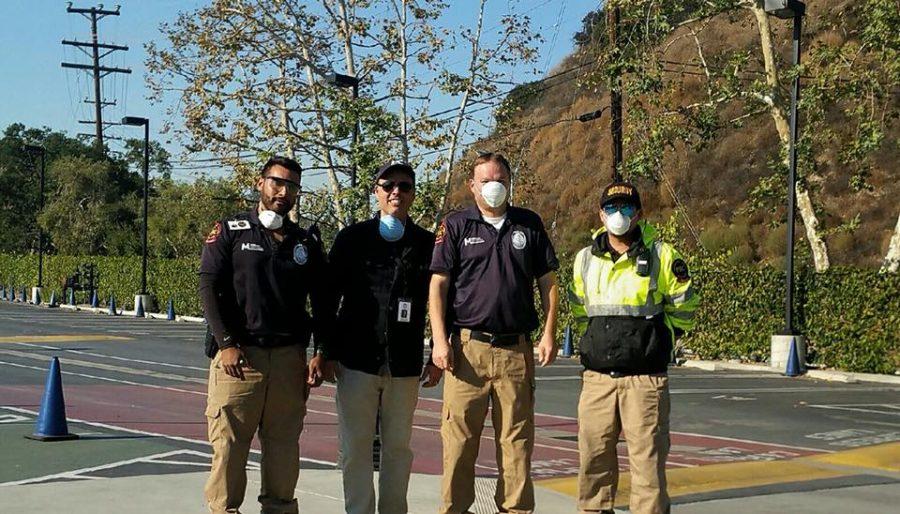A New Normal: Roomier Classes and Virtual Meetings
Natalie Tabibian
Co-Editor-in-Chief
Students sitting in desks six feet apart. Virtual town meetings. A Coronavirus safety committee patrolling campus. These are all possibilities for school next fall.
However, these situations are just possibilities. These times are filled with uncertainty and very little is certain. Getting back a semblance of normalcy seems nearly impossible. With all the unknowns, the Milken leadership is focusing on the ways in which they can bring the community together and the possibilities for continued learning next fall. The coming year will undoubtedly be strange, and filled with creative solutions for classrooms, town meetings, lunches, and every other aspect of life at Milken.
The Roar spoke with both Director of Operations and Campus Safety Nathan Humphries and Head of School Dr. Sarah Shulkind regarding what school will look like in the fall amidst the Coronavirus pandemic. While many aspects of our day-to-day life will be consistent in their abnormality, Milken is attempting to maintain some regularity through our community as it is likely that we will return to campus in the fall.
A likely possibility for the fall is to return to campus and continue some social distancing practices while at school. Dr. Shulkind notes that discussions are in the works regarding what clear indicators are needed in order to decide if and when Milken feels it is safe to come back on campus. But, she “really [believes] we will be back in person” by this fall.
In order to do so, Humphries has been working on utilizing the space correctly and ensuring that Milken will meet the new requirements of occupancy. He notes that they need to “rethink the way we utilize the campus” using public information given by government and health officials, as well as his personal relationship with members of the LAPD, city officials, and conference calls with other members of campus safety teams around the country. This is to ensure a safe environment, both from a “physical distancing perspective and also, from a peace of mind perspective” in order to prepare for what he describes as the “new norm.” When asked about a possibility of continuing entirely virtual learning in the fall, he thinks it is premature to make that decision, although it is “something that needs to be looked at” and there may be a “hybrid scenario where some students are on campus and some are distance learning.” Dr. Shulkind gives an example of a student who came in contact with the virus and would need to be a “virtual presence” in the classroom through Zoom while in quarantine.
Physical distancing at school can seem unrealistic. Humphries says that based on the recommendations, at the moment, the reality will include measures to keep students six feet apart and to have scattered class schedules. While the school previously would try to have as many students in a classroom as possible, the opposite is now true. The operations and campus safety teams are currently working on reformulating the campus to physically place desks six feet apart. When faced with the challenges of maintaining space between students during non-academic times, he says that he is discussing the creation of a “Coronavirus safety committee” that will be responsible for education on the new requirements, creating a clear expectation, and enforcing such requirements as well.
Beyond the challenges among the physical distancing and class schedules, Humphries emphasizes the collateral consequences of these practices. For one, he anticipates the traffic impacts as students will be discouraged from carpooling: “while we can meet the demands for occupancy …. what we don’t know and can’t predict at this moment is the reaction of parents and students regarding how to get to campus.” A possible scenario is that there will be neither consistent busing nor carpooling, leading to increased traffic, limited parking space, and environmental repercussions.
Despite these possible scenarios, Dr. Shulkind notes that: “there are a lot of unknowns even for people who know a lot.” Everyday aspects of life at Milken, like lunch or bathrooms, for example, must be modified to fulfill the social distancing requirements through creative solutions. Even town meetings will likely be either smaller or virtual in order to still maintain a sense of community while remaining safe. The sports season is planning to be launched on August 10th, like normal, but modifications may be made for viewing games or for traveling to other campuses. As far as the musical goes, a smaller cast and virtual streaming of productions may be required.
The main question that most students and parents are concerned about is when will we get back to normal. The challenge lies in preparing for the unknown. Humphries says that he is unsure if “it will ever go back to the way it was last year before there is a vaccine available.” Pre-vaccine, he does not think it will ever go back to what life and school were like before the outbreak.
Humphries gives advice to Milken students concerned about school next year, noting that they should be “mindful of the recommendations of local health officials” and if they follow them, that once we reopen, he will ensure that campus will be safe as Milken is planning on going “above and beyond the recommendations.” He advises students to process these adjustments before coming to school and realize the new ways in which we can show affection to one another without physical contact.
To those who are anxious, Dr. Shulkind says, “me too.” The world is experiencing a sense of trepidation over keeping themselves and their loved ones safe. She consoles students by saying that they are in the hands of people that deeply care about them and will take every precaution to maintain both their mental and physical health.
An eternal optimist, Dr. Shulkind looks at the “silver lining” this pandemic has brought. She notes the success of online meetings and the ability to get 30 grandparents on Zoom, which would have never occurred on Milken’s campus due to logistical issues. Continuing her mission to build a greater community throughout Milken, Dr. Shulkind views this situation as an opportunity for greater connections. Although nothing can replace the togetherness of an alumni Shabbat dinner, she sees how the pandemic is making people realize the value of the community. Most of our lives up until this point have been planned and filled with a degree of certainty. This security is merely a facade, as Dr. Shulkind notes that” the blessing of this crisis has been that we realize that it is a total illusion” and it has been a reminder of the everyday value of what we gain from school at Milken.

Natalie Tabibian is excited to spend her senior year as Co-Editor-In-Chief! After joining The Roar in her sophomore year, she has written a variety of...



